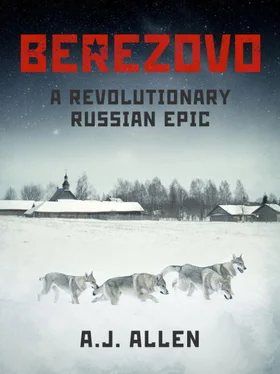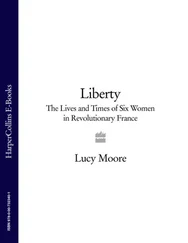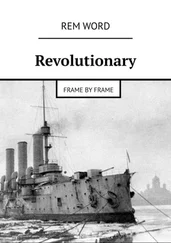Remembering the weary rider he had watched from the window, Roshkovsky made room for Belinsky to join him on the sofa but the builder ignored him. Instead Belinsky crossed to the fireside and lowered himself into a chair opposite the schoolteacher, grumbling as he did so. “About time too. Let’s get on with it.”
“With your permission then, gentlemen,” continued Dresnyakov, “I shall begin by reading the minutes of our last meeting.”
From his vantage point beside the fire Belinsky studied the faces of the other men. To his eyes they were all the same. Men of letters; smooth men of polished words and endless committees. They would spend weeks and weeks agonising over who was going to be responsible for what and why, forgetting that it was only he – Yuli Nikitavich Belinsky – who could bring substance to the play. He would be the one who built the sets and painted the scenery; who made sure the doors opened properly and that the curtains didn’t collapse (as they had done two years ago when that blockhead Tachminov had been in charge). That is what this country needs , he thought. A few more practical men like myself who know how to get the best out of the materials that are to hand… Who know how to boot arses and don’t have to go grovelling to the Jews every time their money runs out.
Having completed reading the minutes, Dresnyakov turned to the second item on the meticulously written agenda that lay upon his knee. Nodding to Maslov, he invited the librarian to present his report. Nervously adjusting his cravat, the small man sprang to his feet and, after acknowledging his colleagues with a series of bows, addressed the other members of the drama committee.
“As you may recall,” he began, “I ordered the scripts of the two sketches we are to produce, namely The Bear and A Tragedian Despite Himself by Anton Chekhov, from the General Book Distributors in Tobolsk. I am pleased to report that these have now arrived and are, at this very moment, awaiting the committee’s pleasure in my storeroom.”
This news was not unexpected and his announcement was greeted by wry expressions of congratulation. He had informed each of them individually of the scripts’ arrival several times since the Committee’s last meeting. Neither were the other members of the group tempted to ask what good the scripts were doing in the library storeroom when their rightful place was in the hands of those charged with their translation into the spoken performance. They knew the librarian too well. Alexander Maslov would cling onto the scripts until the very last moment, enjoying the frisson of power conveyed by their possession.
“I have also taken the liberty,” Maslov went on, “of extracting one or two articles from theatrical magazines in my possession concerning the special problems presented by a production of these works. I thought that, since it is the good doctor’s first excursion into the thespian art, they may be of some small service to him.”
Dr. Tortsov’s smile tightened as he watched Maslov delve into a pocket and produce a thick sheaf of papers. He steeled himself for yet another lecture from the town’s self-appointed dramaturge.
Catching his eye, Dresnyakov hastily intervened.
“Thank you, Alexander Vissarionovich. Now, may I ask…”
But Maslov was not to be stopped so easily.
“If you will just allow me to observe,” he continued, “the great dramatic theorist and director Stanislavsky says that Chekhov presents his characters from within, or rather…”
“Yes, thank you, Alexander Vissarionovich!” repeated Dresnyakov.
“Or rather,” persisted the librarian, “he allows us to see the inner compulsions which activate his people, whilst letting the exterior actions or…”
“THANK YOU, ALEXANDER VISSARIONOVICH!”
This time there was no mistaking the schoolmaster’s determination to uphold the authority of the Chair. So loud had his voice been that it sent the little man scurrying back to his seat, twitching apologetically as he looked around him.
“Really, gentlemen!” said Dresnyakov with mock severity. “If we are to get through our business we must learn to limit our contributions to the subject in hand, otherwise, we shall never be finished. Now, if we may proceed,” he continued, pointedly overlooking Maslov’s upraised hand. “I shall now call upon Andrey Vladimirovich to tell us of the progress he has made regarding acquiring the venue for the production.”
“Certainly, Nikolai Alexeyevich,” responded Roshkovsky easily.
Unlike the previous speaker, the land surveyor did not rise from his seat but contented himself with leaning forward and ticking off the points of his report on the fingers of one elegant hand as he dealt with them.
“I have spoken with Captain Steklov. Once again he has kindly allowed us the use of the barracks for our production. Incidentally,” he added, turning to Belinsky, “the captain told me that you could take the measurements for the stage area any time you like, but that he would be obliged if you could restrict the construction of the scenery itself until the Wednesday before the performance.”
“That’s damned tight,” growled the builder. “I might not be able to get it all done; not without cutting into day work.”
“Captain Steklov is happy to lend you a squad of men to help,” the land surveyor assured him. “And we could easily borrow a wagon to transport any finished pieces from your yard.”
“I hope that the captain has made a note of when the play is to take place,” said Dresnyakov. “It would be most unfortunate if it conflicted with a visit from the general or someone.”
“Don’t worry,” replied Roshkovsky. “I saw him ring the date on his calendar myself. Sunday the eleventh of February, for one night only. I have also spoken to Lev Polezhayev. He is prepared to alter any existing costumes, or even run up new ones, at a discount. Without seeing the scripts, I couldn’t give him an idea of what might be needed, but his rates are usually reasonable.”
There was a general buzz of agreement.
“Finally, I have calculated that, if we did not use more than a third of the total area for the stage this year, we should be able to seat between a hundred and fifty and two hundred people in some degree of comfort. As to where we get the seating from, I shall let the committee determine that.”
Notwithstanding the problem with locating the necessary chairs and benches, this last piece of news was greeted with approval.
“Two hundred people!” cried Maslov. “What a production!”
Normally taciturn, even Doctor Tortsov was moved to express his enthusiasm and it was some moments before their chairman was able to restore order once more. When at last he had done so, he thanked the land surveyor for his report and called upon the doctor to furnish them with the last piece of intelligence they required: namely the date upon which the roles would be cast.
“Wednesday evening, the thirty-first of January,” announced Dr. Tortsov crisply.
“Then I declare this meeting closed, gentlemen. Our next meeting will be next Wednesday evening.”
As the five men rose to stretch their legs, Belinsky asked, “Who is this Chekhov then?”
Ignoring Maslov’s snigger of disbelief, Dr. Tortsov provided the answer.
“He is, or rather was, a playwright from Yalta who also wrote some excellent short stories. He died only recently; about two or three years ago, I believe.”
“Huh! I knew it!” growled Belinsky. “A soft southerner. I suppose the plays will be full of all sorts of rubbish glorifying queers and terrorists and such like.”
“On the contrary,” the doctor corrected him genially, “one of Chekhov’s most admirable qualities, and the reason for his enduring popularity, is that he touches upon only the more conventional subjects. Isn’t that so, Nikolai Alexeyevich?”
Читать дальше












